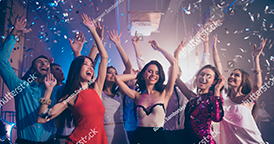The photo booth has evolved significantly over the years, with the advent of artificial intelligence (AI) taking this once-static experience into a realm of dynamic, engaging, and highly personalised interactions. AI-powered photo booths are increasingly becoming a staple in marketing and entertainment at various events, offering a blend of creativity and technology. Here, we explore five notable events where AI-powered photo booths were successfully utilised to enhance user engagement and generate lasting memories.
1. Coachella Music Festival
Overview: Coachella, one of the most popular music and arts festivals in the world, is known for pushing the boundaries of festival experiences. In recent years, they have incorporated AI-powered photo booths to offer festival-goers a unique way to capture their experiences.
Implementation: The AI booths at Coachella allowed attendees to step into a fully immersive experience. Using advanced computer vision and generative AI, these booths could transform the backgrounds of photos to reflect various Coachella-themed environments. Participants could choose from a range of backdrops, from psychedelic desert scenes to futuristic landscapes.
Impact: This feature not only provided a fun and interactive way for attendees to document their time at the festival but also encouraged social sharing. The unique and highly personalised photos led to increased visibility on social media platforms, as participants were eager to share their custom festival pictures. The campaign resulted in a significant uptick in user-generated content, boosting Coachella’s online presence and reinforcing its reputation as a cutting-edge festival.
2. CES (Consumer Electronics Show)
Overview: CES is the global stage where innovations in consumer technology are introduced to the marketplace. In this context, photo booths powered by AI were a natural fit, showcasing the latest in image processing and interactive technology.
Implementation: At CES, various tech companies deployed AI photo booths that used facial recognition and deep learning algorithms to create instant, stylised portraits of attendees. These portraits were not just simple filters; the AI could generate complex artistic renditions of the photos, such as turning them into oil paintings, sketches, or comic book panels.
Impact: These AI-generated portraits were a hit among CES attendees, who were keen to see how technology could reinterpret their likeness in real time. The booths also collected valuable data on user preferences and interactions, providing companies with insights into consumer behavior. The success of these booths at CES underscored the potential of AI in enhancing user experience and engagement at tech-focused events.
3. New York Fashion Week
Overview: In the world of fashion, staying ahead of the trend is crucial. New York Fashion Week (NYFW) is a major industry event where designers and brands showcase their latest collections. AI-powered photo booths were introduced to create a buzz and provide an interactive element to the event.
Implementation: The AI booths at NYFW were designed to blend the worlds of fashion and technology. Attendees could step into the booth and have their photo taken, which the AI would then overlay with digital fashion accessories, such as hats, glasses, and jewelry, tailored to their style preferences. The AI could also suggest outfits based on the attendee’s personal style captured in the photo.
Impact: This innovative use of AI not only provided a fun and memorable experience for attendees but also allowed brands to interact directly with consumers in a personalised way. The digital accessories and outfits could be shared on social media, tagged with brand names, leading to increased brand exposure and consumer interest. The AI booths at NYFW exemplified how technology can be integrated into traditional industries to enhance engagement and marketing reach.
4. Super Bowl Fan Experience
Overview: The Super Bowl is not just about football; it’s a massive event that includes entertainment, fan engagement, and interactive experiences. AI-powered photo booths were part of the fan zone, providing an exciting way for fans to capture their Super Bowl memories.
Implementation: These photo booths were equipped with AI capabilities that allowed fans to customise their photos with team logos, colors, and other football-related graphics. Fans could also participate in virtual photo opportunities with their favorite players, made possible through AI and augmented reality technologies.
Impact: The AI photo booths added a layer of personaliation and excitement to the fan experience. Fans were eager to share their customised photos on social media, generating buzz and increasing the event’s digital footprint. This integration of AI technology into the Super Bowl fan experience demonstrated the potential of interactive digital solutions in enhancing large-scale events.
5. Comic-Con International
Overview: Comic-Con is a premier event for fans of comics, movies, TV shows, and more. Given the creative and visual nature of the event, AI-powered photo booths were a perfect addition, offering fans a way to immerse themselves in their favorite universes.
Implementation: At Comic-Con, AI photo booths were set up with various themes and backgrounds from popular franchises. Fans could choose a backdrop from their favorite comic or movie and have their photo taken. The AI would then integrate them into the scene, complete with costumes and props from the chosen theme.
Impact: This provided fans with a unique souvenir from the event and encouraged social sharing, as attendees were keen to show off their personalised Comic-Con photos. The booths also offered a way for brands and studios to promote their latest releases by featuring them as background options. This use of AI at Comic-Con highlighted how technology can enhance fan experiences and create marketing opportunities.
AI-powered photo booths are revolutionising the way events engage with their attendees. By offering personalised and interactive experiences, these booths not only enhance the event experience but also provide valuable marketing opportunities for brands and event organisers. As AI technology continues to advance, we can expect to see even more innovative applications of photo booths in events of all kinds, further blurring the lines between reality and digital artistry.























































